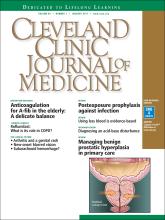ABSTRACT
Guidelines for managing atrial fibrillation recommend systemic anticoagulation for almost all patients age 65 and older, but in practice up to 50% of older patients do not receive maintenance anticoagulation therapy. The most common reason physicians cite for withholding anticoagulation in older patients with atrial fibrillation is a perception of a high risk of falling and associated bleeding, especially intracranial hemorrhage.
Footnotes
Dr. Hagerty is supported by a National Institutes of Health, National Research Service Award (5-T32-HL07081-40) from the National Heart, Lung, and Blood Institute.
- Copyright © 2017 The Cleveland Clinic Foundation. All Rights Reserved.
- Michael W. Rich, MD⇑
- Director, Cardiac Rapid Evaluation Unit, Barnes-Jewish Hospital
- Professor of Medicine, Washington University School of Medicine, St. Louis, MO
- ADDRESS:
Michael W. Rich, MD, Washington University School of Medicine, 660 S. Euclid Avenue, Campus Box 8086, St. Louis, MO 63110; mrich{at}wustl.edu
ABSTRACT
Guidelines for managing atrial fibrillation recommend systemic anticoagulation for almost all patients age 65 and older, but in practice up to 50% of older patients do not receive maintenance anticoagulation therapy. The most common reason physicians cite for withholding anticoagulation in older patients with atrial fibrillation is a perception of a high risk of falling and associated bleeding, especially intracranial hemorrhage.
Footnotes
Dr. Hagerty is supported by a National Institutes of Health, National Research Service Award (5-T32-HL07081-40) from the National Heart, Lung, and Blood Institute.
- Copyright © 2017 The Cleveland Clinic Foundation. All Rights Reserved.






